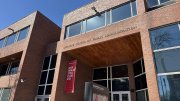Martin (“Marty”) Baron, executive editor of The Washington Post since 2013, will be the principal speaker at the afternoon exercises for Harvard’s 369th Commencement ceremonies, scheduled for May 28, in Tercentenary Theatre. At the Post, according to his official biography, he oversees the newspaper’s print and digital news operations, comprising more than 800 journalists, who have won nine Pulitzer Prizes spanning national reporting, explanatory reporting, investigative reporting, criticisms, feature photography, and public service. Baron previously served as editor of The Boston Globe (2001-2012), which won the Pulitzer Prize for public service in 2003 for its coverage of clergy sex abuse in the Catholic Church; and he has held senior editing positions at The New York Times, Los Angeles Times, and Miami Herald (where he began his journalism career in 1976). Baron was born and raised in Tampa, and earned his B.A. and M.B.A. degrees at Lehigh University, where he edited the student newspaper. He will add a Harvard honorary doctorate on the morning of May 28.
Baron is the second guest speaker at Commencement during the Harvard presidency of Lawrence S. Bacow. Angela Merkel, chancellor of Germany, appeared in 2019. She of course is a towering leader of Europe’s central democracy and economy at a time of severe challenges to democratic governance, openness to global trade and the free movement of peoples, and multinational diplomacy. Baron is perhaps the most identifiable and successful newspaper editor, now in the national’s capital, during an era of traumatic change within the print news business and of unprecedented attacks on journalism and independent newsgathering by this country’s elected leaders and those of some other nations. At a minimum, his selection, during a heated national election, can be seen as a University statement of commitment to its core values of unimpeded access to information, the pursuit of Veritas, and full, free civic debate.
In a statement in the University announcement, Bacow said, “Marty Baron has led some of our nation’s most respected newspapers through a transformative time for American journalism. His distinguished career bespeaks a deep commitment to the pursuit of truth and to the vital role of a free press in a democratic society.”
“For decades, Marty Baron has pursued truth and tirelessly championed the role of journalism in enabling healthy democracy and fact-based discourse and debate on critical issues around the world,” said Alice Hill, president of the Harvard Alumni Association, in the news release. “A bold and decisive leader in his field, Marty’s distinguished career has been marked by determination, integrity, and a willingness to listen to the powerless and too-often voiceless. He will both inspire and engage our graduating students, Harvard alumni, and our entire community.”
The news announcement noted, among highlights of Baron’s career, his role in “shepherd[ing] his news staffs to 16 Pulitzer Prizes” to date. He was awarded the 2019 Goldsmith Career Award for Excellence in Journalism by the Shorenstein Center on Media, Politics and Public Policy at Harvard Kennedy School. Accepting that award, Baron highlighted the role of reporters as “activists only in service of finding out the facts, and finding out the truth.”
Read the University announcement here.









